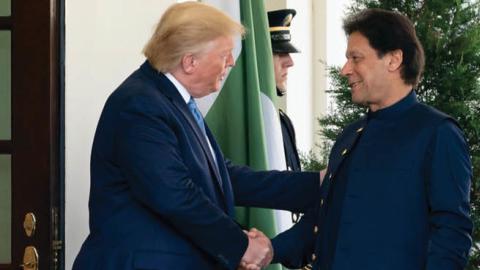President Donald Trump’s visit to India marks the culmination of the process of transforming India’s relations with the United States into what then-President Barack Obama described as ‘the defining partnership of the twenty-first century.’
The process began two decades ago, but it needed the latest ‘ love fest ’, as some described the Trump trip, to overcome several psychological barriers created by earlier encounters.
India’s adulation for Trump in February 2020 was in stark contrast with the reservations encountered during the December 1959 journey of Dwight Eisenhower, the first US president to visit the subcontinent officially.
The Eisenhower visit
Although hundreds of thousands of Indians turned out for Eisenhower’s public address in the Ramlila Maidan in Delhi, India was less than enthused by then-burgeoning US alliance with Pakistan.
Eisenhower travelled to Pakistan, Afghanistan, and India though he wrote in his memoirs that India was the magnet that drew him to the region.
At that time, India’s ties with China had begun to deteriorate, and nonalignment notwithstanding, India had worked with the Americans to support the Tibetan revolt led by the Dalai Lama’s supporters.
By visiting both countries on the same trip, Eisenhower sought to build bridges between India and Pakistan. He hoped that he could persuade both countries to become America’s partners in containing communism.
US’ Pakistan connect
It is a reflection of the consistent belief of Americans in their ability to solve the world’s problems that Trump mentioned improving US ties with Pakistan during his stand-alone India visit.
But Trump so far has no plans to visit Pakistan, a country Indians see as a safe haven for and sponsor of terrorism. During his address at Motera Stadium in Ahmedabad, Trump said that India and the US were committed to fighting terrorists and their ideology.
He linked efforts to better ties with Pakistan to fighting “against threats from radical Islamic terrorists”. That is why “my administration is working… with Pakistan to crack down on terror organisations that operate on the Pakistani border,” he said.
If his hopefulness ever lands him in Pakistan, Trump will find that the Pakistanis will do their best to outdo the Indians in showing admiration for him and the United States.
Upon Eisenhower’s arrival in Karachi in 1959, Mohammad Ayub Khan and his administration had also spared no effort in trying to convince him that Pakistan was America’s dependable ally.
The hospitality was impeccable. The city was decorated with bunting and illuminated at night to mark the US president’s visit. A musical fountain was built near the president’s house where he was to stay.
As 750,000 flag-waving Pakistanis lined the streets, Ayub and Eisenhower drove 25 km from the airport into downtown Karachi.
For the final mile, they rode in an open, horse-drawn carriage to Ayub’s official residence, with a cheering crowd surrounding them the entire way. The US president could not help but be charmed.
Read in The Print

















